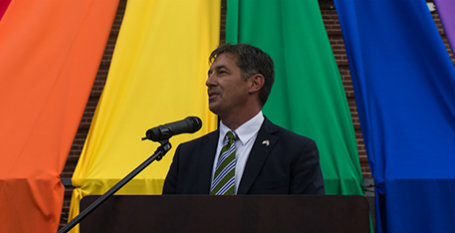The United States' first special envoy for gay and lesbian rights may help eradicate discrimination in Asia that has some of the world’s harshest anti-gay laws.
"Too often, in too many countries, LGBT persons are threatened, jailed, and prosecuted because of who they are or who they love," US Secretary of State John Kerry said in a statement, according to an AFP report.
Randy Berry, current US consul-general in Amsterdam was named the envoy Feb 23 in the hope that he would "significantly advance efforts under way to move towards a world free from violence and discrimination" against LGBT people, Kerry said.
"It’s time to assert the equality and dignity of all persons, no matter their sexual orientation or gender identity," Kerry added.
Human Rights Campaign President Chad Griffin said in a statement: “At a moment when many LGBT people around the world are facing persecution and daily violence, this unprecedented appointment shows… we’ve got to work harder than ever to create new allies, push back on human rights violators, and support the brave leaders and organizations that fight for LGBT rights around the world."
The United Nations says hate crimes against members of the LGBT community have been on the rise recently. Globally there are at least 76 countries where being gay remains a criminal offense, many of them in Asia.
In South and Southeast Asia, Bangladesh, India, Malaysia, Myanmar, Pakistan, Singapore outlaw consensual gay sex. In Malaysia and Singapore for example, same-sex relations is illegal and punishable by jail and public caning and the tiny Southeast Asian kingdom last year decreed into law the strict Islamic Sharia penal code that calls for death by stoning for same-sex relations.
In heavily Muslim Indonesia, gay sex is not nationally criminalized, but the country’s utra-conservative Aceh province recently passed a law to punish same-sex relations with 100 lashes of the cane.
Elsewhere in Asia, in countries such as Iran and Saudi Arabia, gay people can be given the death sentence for their sexual orientation.
No Asian nation as yet allows gay marriage, though Thailand has a government-sponsored campaign to attract gay tourists, while China, Vietnam and Taiwan are increasingly accepting of gays and lesbians.
The United States' first special envoy for gay and lesbian rights may help eradicate discrimination in Asia that has some of the world’s harshest anti-gay laws.
"Too often, in too many countries, LGBT persons are threatened, jailed, and prosecuted because of who they are or who they love," US Secretary of State John Kerry said in a statement, according to an AFP report.
Randy Berry, current US consul-general in Amsterdam was named the envoy Feb 23 in the hope that he would "significantly advance efforts under way to move towards a world free from violence and discrimination" against LGBT people, Kerry said.
"It’s time to assert the equality and dignity of all persons, no matter their sexual orientation or gender identity," Kerry added.
Human Rights Campaign President Chad Griffin said in a statement: “At a moment when many LGBT people around the world are facing persecution and daily violence, this unprecedented appointment shows… we’ve got to work harder than ever to create new allies, push back on human rights violators, and support the brave leaders and organizations that fight for LGBT rights around the world."
The United Nations says hate crimes against members of the LGBT community have been on the rise recently. Globally there are at least 76 countries where being gay remains a criminal offense, many of them in Asia.
In South and Southeast Asia, Bangladesh, India, Malaysia, Myanmar, Pakistan, Singapore outlaw consensual gay sex.
In Malaysia and Singapore for example, same-sex relations is illegal and punishable by jail and public caning and the tiny Southeast Asian kingdom last year decreed into law the strict Islamic Sharia penal code that calls for death by stoning for same-sex relations.
In heavily Muslim Indonesia, gay sex is not nationally criminalized, but the country’s utra-conservative Aceh province recently passed a law to punish same-sex relations with 100 lashes of the cane.
Elsewhere in Asia, in countries such as Iran and Saudi Arabia, gay people can be given the death sentence for their sexual orientation. No Asian nation as yet allows gay marriage, though Thailand has a government-sponsored campaign to attract gay tourists, while China, Vietnam and Taiwan are increasingly accepting of gays and lesbians.

